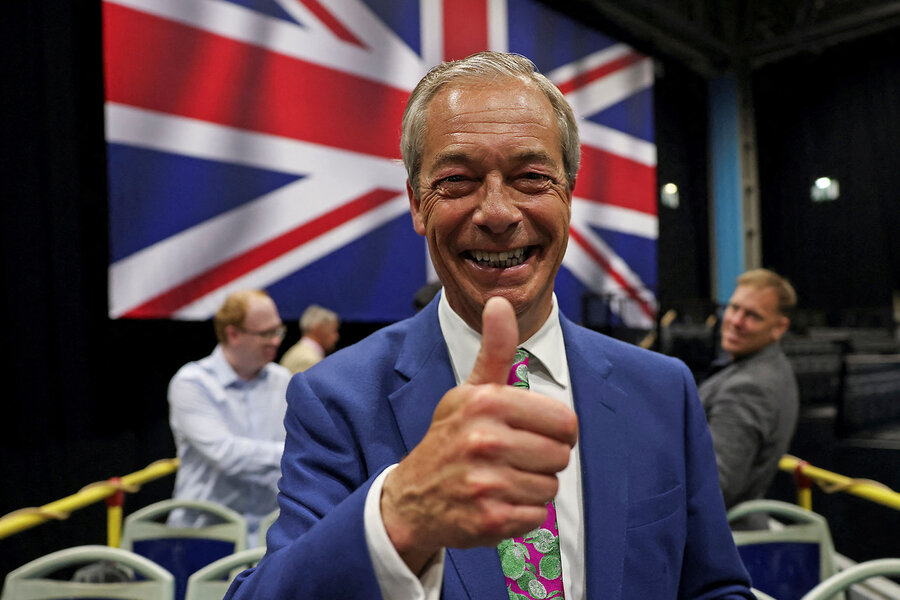
UK Conservatives are about to lose big. Here’s how the Reform party is making it happen.
Keiron McGill delivered pizza to earn extra income during the pandemic; five years later he’s self-funding a run for Parliament as a Reform UK candidate.
Scrappy and persistent, and armed with a dozen volunteers and thousands of leaflets, the printing accounts manager and his party are now projected to take as much as a quarter of the vote in a district that had been a stronghold of the ruling Conservative Party.
It’s a dynamic that’s repeating itself all over England as the United Kingdom approaches Thursday’s general elections. “There’s been a sea change of attitude of people thinking, not only does the current Conservative government not work for them, but the opposition [Labour Party] doesn’t either,” says Mr. McGill. “They want a real change away from the two-party system.”
His Reform campaign in Castle Point – a largely well-to-do coastal district an hour east of London – had been relatively quiet until last month, when charismatic, anti-immigration populist Nigel Farage announced his reentry onto the British political scene. Mr. Farage declared that he had taken control of the Reform Party – which arose from the remnants of Mr. Farage’s own Brexit Party – and would run for Parliament under its banner.
That’s having spillover effects across Britain.
“It’s been a rocket under our campaign,” says Mr. McGill. “People could not be happier that Reform has got a real sort of outspoken leader, who gets the column inches. Nigel Farage seems to have that X factor.”
Across the nation, Reform is expected to siphon roughly a quarter of those who voted Conservative in 2019. Meanwhile, the Labour Party is thumping Conservatives from the left, and is expected to win at least 430 of the 650 parliamentary seats – more than double its current share.
Barring an earthquake of a surprise, 14 years of Tory rule will end Thursday. The only uncertainty is how big Conservative losses will be.
“What Reform does is potentially change the scale of the defeat,” says Paula Surridge, a political sociologist at the University of Bristol and frequent media commentator. “Yet none of this is possible for Reform without the Conservatives having imploded over a long period.”
“Sleaze and distrust”
Mr. McGill was managing accounts for a printing and photocopier company full time while running a sporting events business on the side when the pandemic hit four years ago. Then the Conservative government shut everything down. “I saw big losses overnight,” he says.
That’s when he began to question his long-held Tory loyalty. Checking out the Reform Party’s website, he saw “no vaccine mandates, no further lockdowns,” Mr. McGill says. “I saw a party actually not afraid to speak.”
Political scientist John Curtice says the Tories have never been in this much trouble, with two crucial events cementing their downward slide.
“No. 1 is [former Prime Minister] Boris Johnson and ‘Partygate’” – the flouting of COVID-19 regulations by the Conservative-led government, says Professor Curtice. “Problem No. 2 is [Mr. Johnson’s] successor Liz Truss’ 49 days in office tried to go for growth” with a tax-cut plan that prompted economic chaos and a tanking of the pound.
That’s led to the loss of one set of voters on “sleaze and distrust,” says Dr. Surridge, and “another whole raft on ‘We might have forgiven that, but you haven’t even managed the economy well.’ The Conservatives have done that to themselves.”
Prime Minister Rishi Sunak, brought in by the Tories to stamp out fires set by Ms. Truss, created some of his own challenges with a series of missteps and a perceived lack of enthusiasm for the job. Recently, he skipped out early on a D-Day celebration in France that had convened veterans and world leaders, irking the public, and a few people close to him were discovered to be placing election-related bets.
The residual effects of the pandemic, runaway inflation, a cost-of-living crisis, monthslong National Health Service waiting lists, and a failure to stem the flow of immigration are among the criticisms being hung on Conservatives. Immigration is the top issue that is pushing Conservative voters toward Reform, says Dr. Surridge.
Reform UK proposes raising the income tax threshold to £20,000 (roughly $25,500), in order to give a boost to people’s personal pocketbooks, and also supports a policy they call “net zero” immigration. It’s resonating with Conservatives.
So is the entry of Mr. Farage, who is “charismatic in a campaign that is short on charisma,” says Professor Curtice. “His arrival gives [Reform] credibility, gives it visibility, gives it volubility, and just ensures that even more Tory voters will switch to that direction.”


Leave a Reply